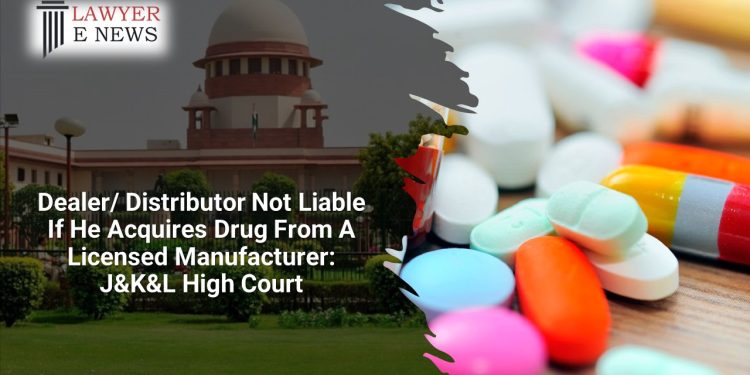Dealer/ Distributor Not Liable If He Acquires Drug From A Licensed Manufacturer: J&K&L High Court

D.D-04.08.2022
The Jammu and Kashmir and Ladakh High Court ruled on Thursday that a person who does not make drugs cannot be held accountable for violating Section 18 of the Drugs and Cosmetic Act if he can prove that he purchased the medicine or cosmetic from a manufacturer who has been granted a valid licence.
A bench led by Justice Sanjay Dhar was collectively hearing petitions in which the petitioners had contested the complaint lodged by the government authority Ladakh against them alleging commission of offences under Sections 18(a)(i) and 27(d) of the Drugs and Cosmetics Act, 1940, which was alleged to be pending before the Court of Chief Judicial Magistrate, Kargil.
The petitioners had contested the aforementioned complaint as well as the order by which the trial magistrate had issued process against them on the grounds that there was no claim made against them in the contested complaint that the medicine in question was improperly stored.
The petitioners further argued that as they were just the distributors of the medicine in question and not its producers, they could not be held accountable for its poor quality.
The respondent Drugs Inspector, Kargil, filed the contested complaint against the petitioners on the grounds that a sample of the drug Tablet Uspas Forte that had been taken from the store of a co-accused was not of standard quality, according to a perusal of the record. The record also showed that the Drugs Inspector filed the contested complaint against the co-accused shopkeeper as well as the other accused in their capacities as distributors, dealers, and producers following the conclusion of the required procedures and investigation.
In ruling on the case, Justice Dhar noted that Section 19(3) of the Drugs and Cosmetics Act of 1940 is unambiguous in stating that a person other than a drug manufacturer cannot be held accountable for violating Section 18 of the Act if he can show three requirements:- That he purchased the drug or cosmetic from a duly licenced manufacturer, distributor, or dealer thereof.
That the medicine or cosmetic, while in his possession, was properly stored and maintained in the same condition as when he received it. That he did not know or was unable to reasonably discern the violation of the Section’s provisions.
The burden of proving the aforementioned conditions would be on the concerned dealer, but in the present case, there are allegations in the challenged complaint that show the petitioners, who had apparently purchased the medicine in question from a duly licenced producer, maintained it appropriately.
The bench observed that the allegations in the contested complaint amply show that the complainant, after looking into the matter, had determined that the manufacturer of the drug in question had violated the Act’s provisions by producing and distributing a drug that was not of standard quality, which implied that the Drug Inspector had found no proof that the petitioners, who just so happened to be the defendants, had not stored the drug in question in a manner that was appropriate.”
The respondent Drugs Inspector could not have prosecuted the petitioners once it was established from the material in the file that they satisfied the requirements of Section 19(3) of the Drugs and Cosmetics Act “The bench made a point.
Accepting the request The impugned complaint and the related proceedings were dismissed by the bench.
Neena Gupta
Vs
UT of Ladakh





